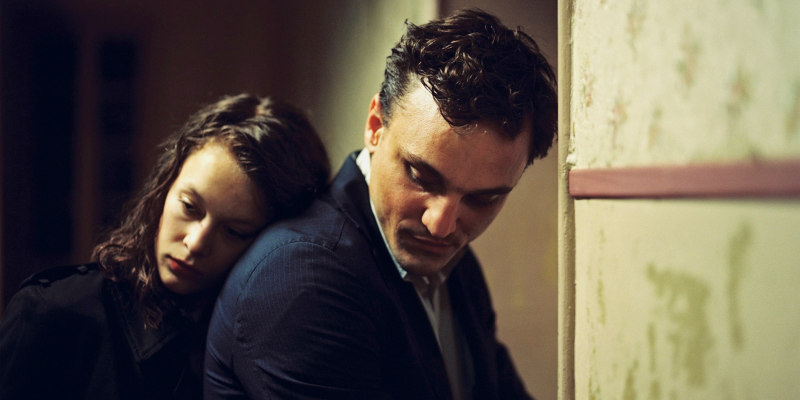Review by Eric Hillis
Directed by: Christian Petzold
Starring: Franz Rogowski, Paula Beer, Godehard Giese, Lilien Batman, Maryam Zaree

"When there's no more room in hell, the dead will walk the earth." So ran the tagline for 1978's Dawn of the Dead, a movie which surprisingly finds itself referenced in Christian Petzold's reworking of Anna Seghers' 1942 novel Transit. A zombie movie may seem an odd reference point for a drama that deals with the encroaching fascism of our times by updating a novel originally set during WWII, but given most of Petzold's film plays out in a purgatory of sorts, perhaps it's more fitting than you might assume.
The purgatory is Marseille, where our protagonist, Georg (Franz Rogowski), a young German man, finds himself spending a few weeks while he waits for a ship to take him to Mexico and away from the impending fall of France to invading Nazi German forces. It isn't 1940, however, but rather modern day, or at least some approximation of our own era (mobile phones and the internet are conspicuously absent).

Tasked with delivering a letter to a fellow German writer in Paris, Georg finds the man, named Weidel, has recently committed suicide. Among Weidel's possessions Georg finds a pair of tickets for a ship set to sail for Mexico from Marseille in three weeks, along with the manuscript of Weidel's latest novel. Finding himself in the port city when a sickly man he was charged with smuggling out of the country dies, Georg decides to take Weidel's possessions to the Mexican consul, believing they might reward him financially, but there he finds himself mistaken for the writer. Georg goes along with this case of mistaken identity and decides to wait out the three weeks and flee France himself.
[ READ MORE: New To DVD - Support the Girls ]
During his stay in Marseille, Georg encounters a Casablanca-esque ensemble of refugees and ex-pats who share his predicament. He befriends the son of his late travelling companion, a young North African boy, and his mute mother. When the boy falls ill, Georg seeks a doctor and comes across fellow German Richard (Godehard Giese) and his lover, Marie (Paula Beer), whom Georg has become beguiled by, having seen her acting mysteriously in the street several times. Georg becomes determined to take Marie with him, but to do so may mean revealing his deception.

Several movies and TV shows have imagined a contemporary world under Nazi occupation, but unlike the likes of Fatherland and The Man in the High Castle, Transit presents occupation in a more banal, relatable manner, with nary a Swastika or rolling tank to be seen. The Nazis haven't yet arrived in Marseille, rather they're represented by hushed talk and an impending sense of doom. Yet the people of the port city go about their business as usual. They can't yet hear the sound of jackboots on their pavements, so perhaps it hasn't hit home yet, or maybe they'll welcome their arrival.
[ READ MORE: New To DVD - Child's Play ]
Transit has been widely acclaimed, but I found myself distracted by too many niggling issues to join such a resounding chorus of approval. Using Germans to represent refugees is a choice that takes a while to accept, and I'm still unsure if it doesn't somewhat trivialise the matter, like how the 1995 movie White Man's Burden posited an America where whites were the downtrodden minority, forcing us to root for the people responsible for the real world mess. Petzold's film also suffers from an implausible level of coincidence, with Georg just happening to stumble across characters he shares a connection with, as though Marseille were some provincial village rather than France's second largest city. One such important character, Marie, makes such a late entry into the drama that her relationship with Georg is so rushed it's impossible to accept as genuine. And then there's that damn voiceover - delivered by the owner of the small café Georg idles his time in, it serves at best to pointlessly describe what we're watching, at worst to lazily fill in narrative and psychological gaps.

Despite such issues, I was never less than invested in Georg's story and the Kafkaesque machinations of Petzold's plot. Looking a lot like a Slavic Vincent Gallo, Rogowski makes for a captivating everyman guide through this world where danger lurks yet nobody seems too perturbed by it. At its best, Petzold's film plays like his riff on Antonioni's The Passenger, with Georg taking the Jack Nicholson role of a man who finds a new purpose in adopting a dead man's identity. But you can only walk in another's shoes for so long, an edict that ultimately applies to both Georg's deception and Petzold's aping of a far superior filmmaker.
In Transit's world, did WWII occur? Or is this Europe's first exposure to Fascism? Have the lessons yet to be learned, or simply forgotten? These are the questions you may come away from Transit with, but on the evidence of our real modern world, the latter seems the more probable answer.

Transit comes to UK DVD October 21st.
"Though clearly updated for a modern audience, Stanley’s film remains faithful to the spirit and intent of Lovecraft’s original tale."— 𝕋𝕙𝕖𝕄𝕠𝕧𝕚𝕖𝕎𝕒𝕗𝕗𝕝𝕖𝕣.𝕔𝕠𝕞 🎬 @ #LFF (@themoviewaffler) October 17, 2019
Read @renzelen's London Film Festival review of COLOR OUT OF SPACEhttps://t.co/9km2XgVij3 pic.twitter.com/qABgyzsqax


